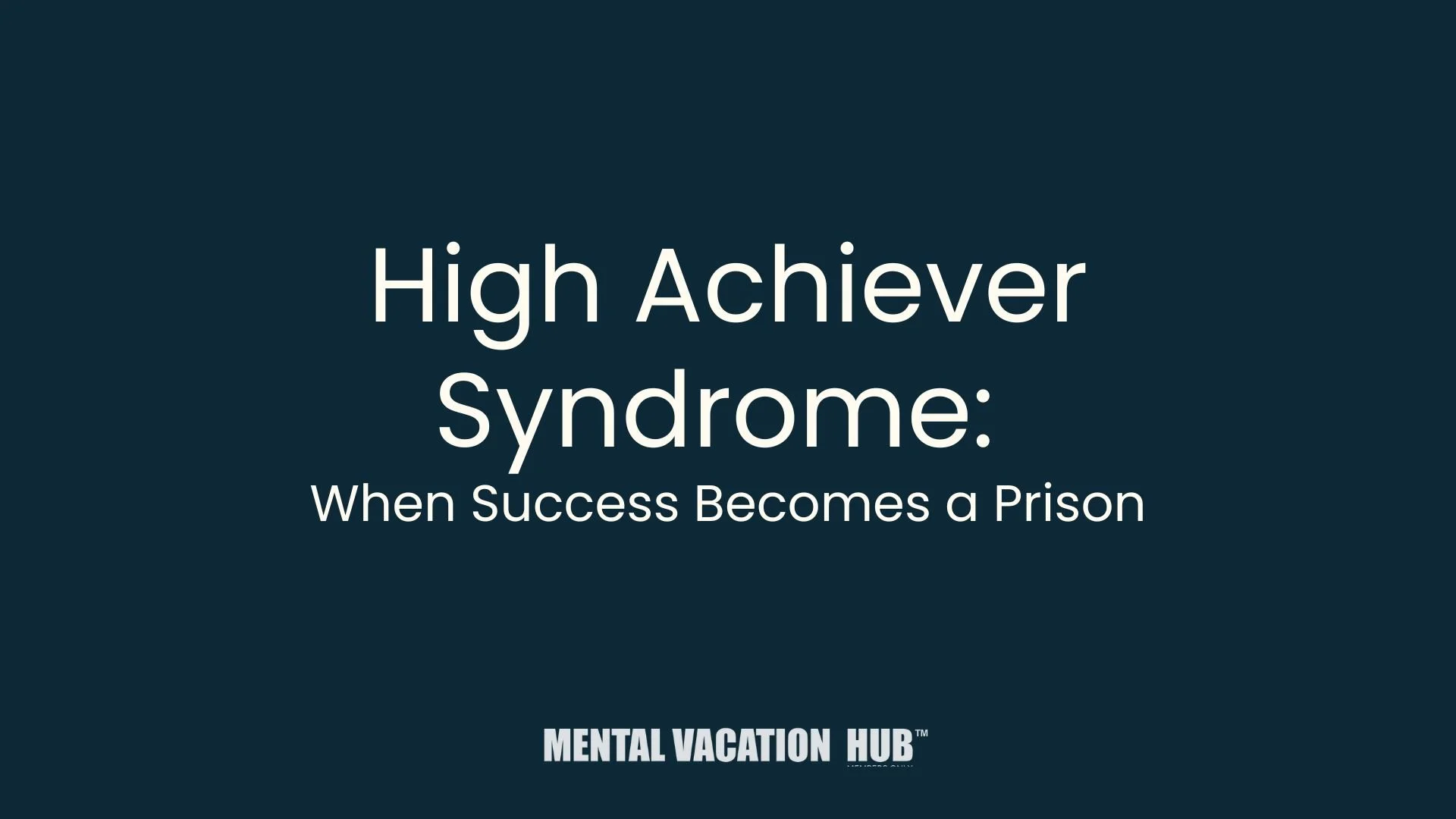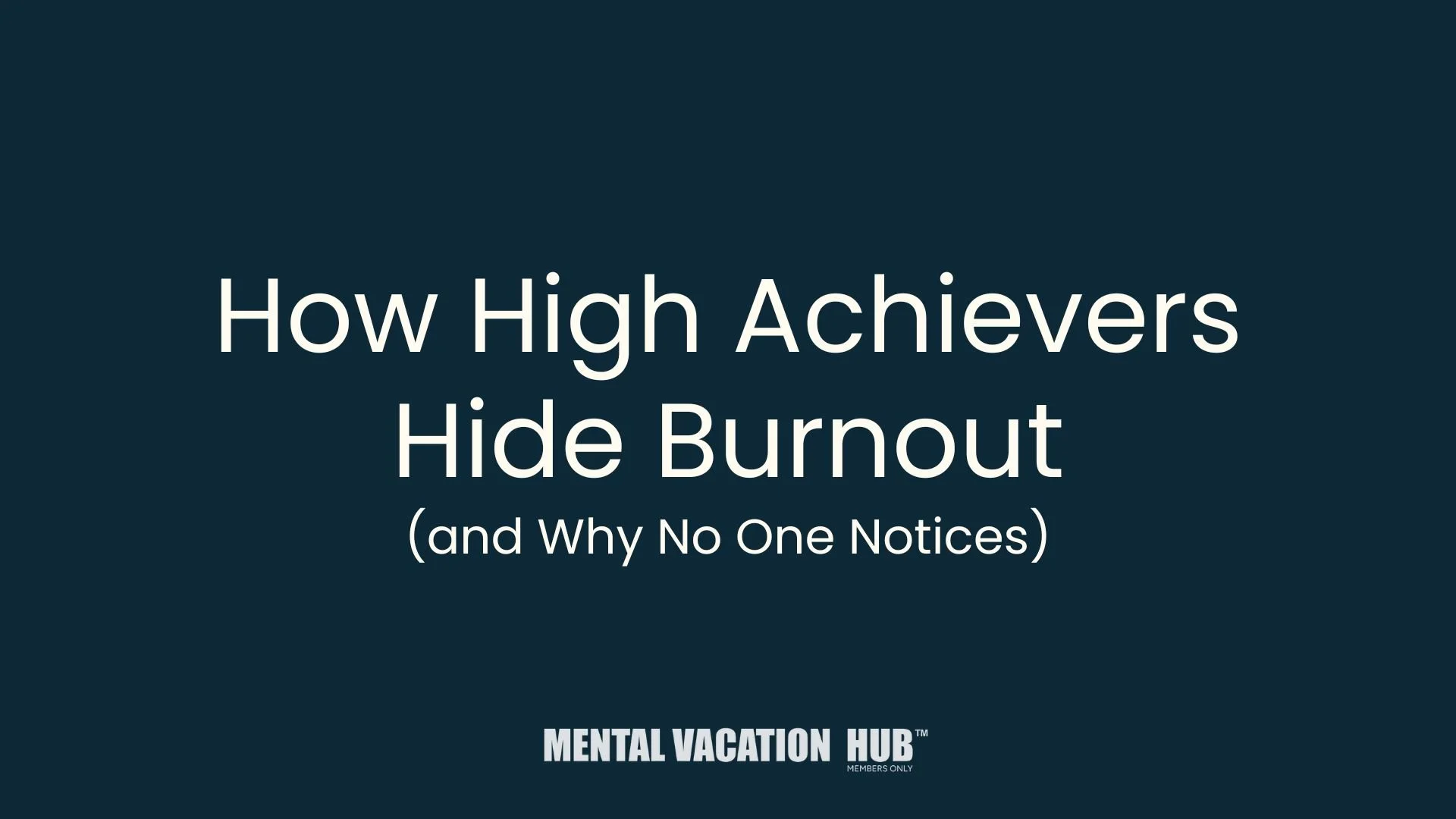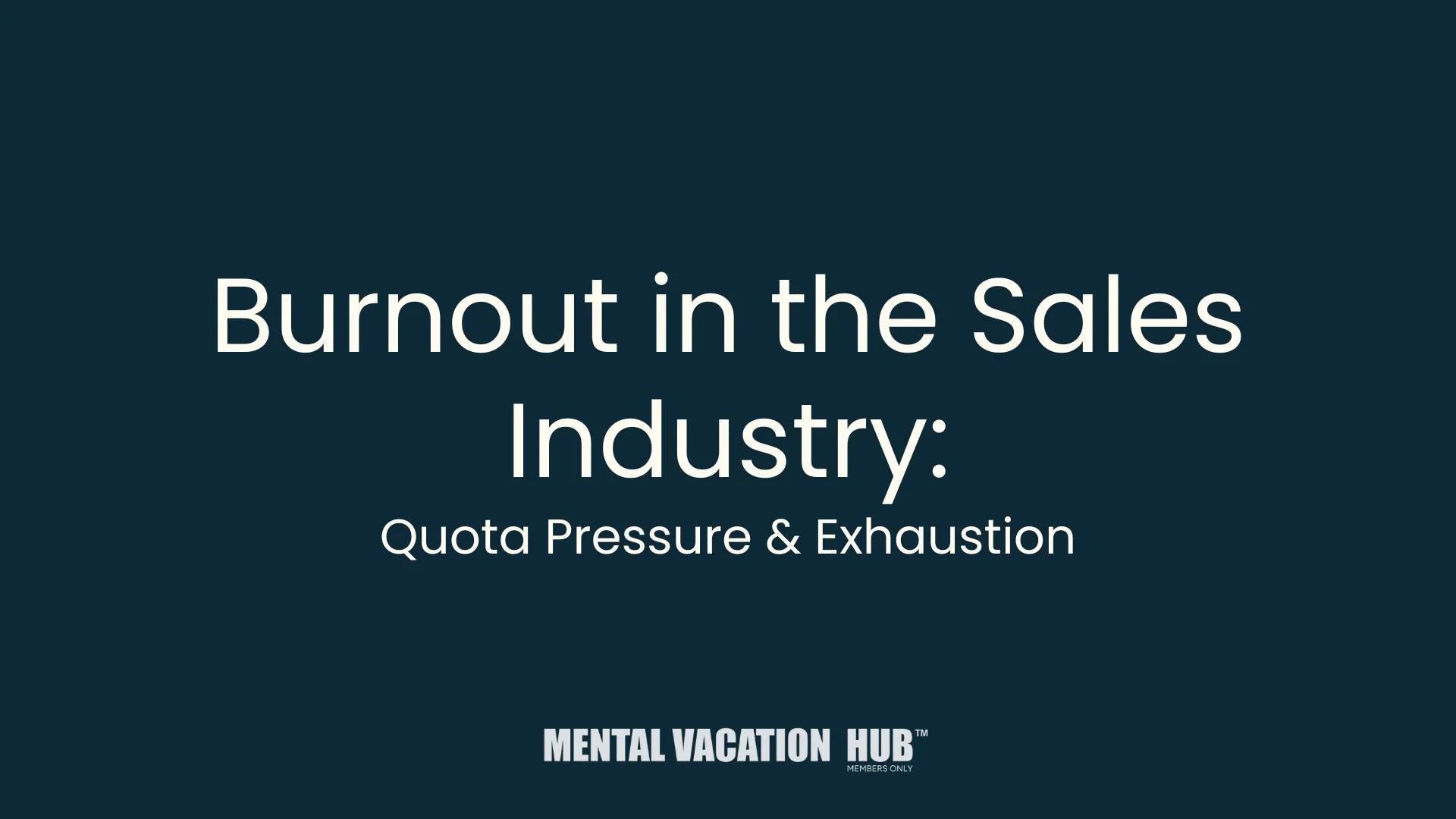High Achiever Syndrome: When Success Becomes a Prison
Success should feel good.
Achievement should create satisfaction. Reaching goals should bring relief. For high achievers, it rarely does. Each accomplishment immediately shifts to the next challenge. Each goal achieved raises the bar higher. Each success creates more pressure to maintain it.
This is high achiever syndrome.
I am the perfect example of the following, unfortunately.
The pattern where achievement never satisfies, goals constantly escalate, and rest feels impossible. Success becomes a prison where the bars are self-imposed standards and the sentence is endless striving. High achievers often don't recognize this as a problem. They see it as ambition, drive, and excellence.
What they don't see is that the pattern leads directly to burnout.
High achiever syndrome is particularly common among executives, entrepreneurs, and professionals in competitive fields.
The traits that create success in these environments also create vulnerability to burnout. Perfectionism, relentless goal-setting, difficulty delegating, and inability to rest all serve achievement short term.
Long-term, they create exhaustion and depletion.
This post explains what high achiever syndrome is, how to recognize it, and why it leads to burnout recovery needs.
What High Achiever Syndrome Actually Is
High achiever syndrome is a pattern of thinking and behaving where achievement becomes the primary source of identity and worth.
Success is never enough. Goals constantly escalate. Rest feels impossible or irresponsible. The person is trapped on a treadmill of endless striving.
This differs from healthy ambition.
Healthy ambition involves setting goals, working toward them, and feeling satisfied when achieved. Then set new goals from a place of genuine interest rather than compulsion. High achiever syndrome involves compulsive goal-setting where satisfaction never arrives and rest is impossible.
Key characteristics of high achiever syndrome:
Achievement is the primary source of identity and self-worth
Goals constantly escalate regardless of accomplishments
Satisfaction is temporary or nonexistent after achievement
Rest feels impossible, irresponsible, or anxiety-inducing
Self-worth is conditional on continued achievement
Perfectionism is pervasive across all domains
Difficulty delegating because others won't do it "right"
Comparison to others is constant and usually unfavorable
Achievement is never enough to prove competence
Fear of failure is intense and paralyzing
Work expands to fill all available time and energy
High achiever syndrome often develops early.
Children praised for achievement rather than effort learn that worth comes from accomplishment. Early success that came easily creates the expectation that continued success should be easy. Competitive environments reward relentless striving.
Over time, the pattern becomes automatic and invisible.
The syndrome isn't the same as being ambitious or driven. Ambitious people can set goals, achieve them, and feel satisfied. High achievers with syndrome are trapped in compulsive striving where satisfaction is impossible. The goalpost moves every time it's reached.
The treadmill accelerates constantly.
Personality traits of a high achiever.
Why High Achiever Syndrome Leads to Burnout
The connection between high achiever syndrome and burnout is direct.
The patterns that drive the syndrome create the conditions for burnout.
Unsustainable pace is the first problem
High achievers often work at a pace that's impossible to maintain long-term. Sixty-hour weeks become normal.
Vacation time gets skipped. Sleep gets sacrificed. The pace feels necessary to achieve goals and maintain success. What's invisible is that the pace is unsustainable.
Eventually, the body cannot maintain it and burnout results.
Perfectionism prevents rest and completion
Nothing is ever good enough.
Projects could always be better. Effort could always be greater. This perfectionism means work is never truly finished. There's no point where the person can step back and rest because there's always more that could be done.
The constant sense of incompleteness prevents genuine rest.
Conditional self-worth creates constant anxiety
When self-worth depends on achievement, any threat to achievement triggers anxiety.
Mistakes feel catastrophic. Setbacks feel like personal failure. Competition feels like survival.
This constant anxiety keeps the nervous system activated and prevents genuine relaxation.
Inability to delegate creates bottlenecks
High achievers often believe others won't do things right, so they do everything themselves.
This creates an impossible workload. Delegation feels risky because standards might not be met. The result is one person trying to do the work of multiple people.
This unsustainable load leads directly to burnout.
Comparison culture creates impossible standards
High achievers constantly compare themselves to others and usually judge themselves unfavorably.
Someone else is more successful, smarter, more accomplished. This comparison creates a constant sense of inadequacy. No achievement feels sufficient because someone else has achieved more.
The goalpost never stops moving.
Achievement provides no satisfaction
This is the core trap of high achiever syndrome.
Achievement should create satisfaction and confidence. In high achiever syndrome, achievement creates temporary relief followed by immediate focus on the next goal. Satisfaction never arrives.
The person is always behind, always inadequate, always needing to do more.
The burnout symptoms that result from these patterns are predictable: exhaustion, cynicism, reduced effectiveness, emotional numbness, physical health deterioration, and eventually complete collapse.
Signs You Have High Achiever Syndrome
Recognizing high achiever syndrome is the first step toward breaking the pattern.
Many high achievers don't realize that what they're experiencing has a name and consequences.
Achievement never feels satisfying
Completing a major project brings temporary relief, then immediate focus on the next thing. Reaching a goal immediately raises the bar higher.
Accomplishments are quickly forgotten and minimized. The person is always focused on what's next rather than acknowledging what's been accomplished.
2. Rest feels impossible or guilt-inducing
Taking time off creates anxiety.
Vacation feels wasteful. Weekends get filled with work. The idea of doing nothing feels irresponsible.
Rest is something that happens after success, but success never arrives, so rest never happens.
Self-worth is entirely tied to achievement
When work is going well, self-worth is high.
When facing a setback or failure, self-worth plummets. The person's value as a human being feels dependent on professional success.
This creates fragility where any professional difficulty threatens identity.
Perfectionism is pervasive
Nothing is ever good enough.
Standards are impossibly high. Mistakes feel catastrophic. The person criticizes themselves harshly for anything less than excellence. This perfectionism extends beyond work into personal life.
Everything must be done well or not at all.
Comparison is constant and unfavorable
Someone else is always more successful, smarter, more accomplished.
The person frequently compares themselves to others and judges themselves as inferior. This comparison creates a constant sense of inadequacy and drives compulsive striving to catch up.
Difficulty delegating or asking for help
Others won't do things right, so the person does everything themselves.
Asking for help feels like weakness. Delegating feels risky. The result is taking on an impossible workload because everything must be done personally.
Work expands to fill all available time.
There's always more that could be done.
Projects could always be better. The person works constantly because stopping feels irresponsible. Boundaries between work and personal life are blurred or nonexistent.
High achiever syndrome checklist:
I feel anxious when not working or achieving
My self-worth depends on professional success
I rarely feel satisfied with accomplishments
I set new goals immediately after achieving previous ones
I have difficulty taking time off without guilt
I compare myself to others frequently
I believe others won't do things as well as I would
I work more than 50 hours per week regularly
I sacrifice sleep, health, or relationships for work
I criticize myself harshly for mistakes or imperfections
I feel like I'm never doing enough
Rest feels irresponsible or wasteful
If more than half of these resonate, high achiever syndrome is likely present.
Breaking Free From High Achiever Syndrome
Breaking the pattern requires addressing both the external behaviors and the internal beliefs that drive them.
1.Separate identity from achievement.
This is the fundamental shift.
Self-worth must be based on being a person, not on professional accomplishments. This is difficult for high achievers because achievement has been central to identity for so long.
Start small: identify one thing about yourself that has nothing to do with work or achievement. Build from there.
2. Set boundaries on work.
Establish specific work hours and protect personal time.
When work time ends, work stops. This feels irresponsible initially. It's actually essential for sustainable achievement. Boundaries allow rest that enables better work.
3. Practice satisfaction.
When something is accomplished, pause and acknowledge it.
Write it down. Tell someone. Notice the accomplishment before moving to the next goal. This practice builds the ability to feel satisfied, which is atrophied in high achievers.
4. Delegate intentionally.
Start delegating tasks even if others won't do them exactly as preferred.
Accept "good enough" from others. This relieves workload and develops trust in others. It also reveals that the world doesn't collapse when things aren't done perfectly.
5. Reduce comparison.
Unfollow people who trigger comparison.
Stop checking others' achievements. Focus on personal goals rather than competitive positioning. Comparison is a trap that prevents satisfaction and drives compulsive striving.
6. Seek professional support.
Working with a therapist who understands high achiever patterns accelerates change. Professional support helps address underlying beliefs and build sustainable patterns.
FAQ
Is high achiever syndrome the same as ambition?
No.
Ambition involves setting goals and working toward them. High achiever syndrome involves compulsive striving where satisfaction is impossible and goals constantly escalate.
Ambitious people can achieve goals and feel satisfied. High achievers with syndrome feel perpetually inadequate regardless of accomplishments.
The key difference is whether achievement creates satisfaction or just drives to the next goal.
Can high achiever syndrome be positive?
In the short term, the drive and perfectionism can create achievement.
Long-term, the pattern leads to burnout, health problems, and relationship damage. The costs outweigh the benefits. Sustainable achievement comes from healthy ambition, not high achiever syndrome.
The syndrome creates impressive short-term results at the cost of long-term well-being.
What if someone's career requires high achiever patterns?
Some competitive fields do reward relentless striving.
However, even in these fields, sustainable success requires boundaries and rest. The high achievers who sustain success long-term are those who build in recovery and don't sacrifice health.
Those who maintain high achiever syndrome patterns usually burn out or experience health crises. Sustainable high achievement requires breaking syndrome patterns.
How long does it take to break high achiever syndrome?
This varies based on how deeply entrenched the pattern is and how much support is available.
With intentional work, noticeable changes happen in 3-6 months. Significant pattern change usually takes 6-12 months. Complete identity shift away from achievement-based worth takes longer.
The key is consistent practice and self-compassion through the process.
What if breaking high achiever syndrome means reduced achievement?
Initially, breaking the pattern might reduce output because the compulsive drive decreases.
However, sustainable achievement actually increases over time because rest and boundaries enable better thinking and performance. The goal isn't less achievement. It's a sustainable achievement that doesn't destroy health.
Most people find that they achieve more over the long term after breaking high achiever syndrome.
Conclusion
High achiever syndrome traps ambitious professionals in cycles of endless striving where achievement never satisfies and rest feels impossible.
Success becomes a prison. The pattern develops early, often from praise for achievement rather than effort, and becomes automatic and invisible.
High achiever syndrome leads directly to burnout through unsustainable pace, perfectionism that prevents rest, conditional self-worth creating constant anxiety, inability to delegate, and a comparison culture.
The core trap is that achievement provides no satisfaction, so the person is always behind and always striving.
Recognizing high achiever syndrome requires honest assessment of whether achievement feels satisfying, whether rest feels possible, and whether self-worth is tied to professional success.
Breaking the pattern requires separating identity from achievement, setting work boundaries, practicing satisfaction, delegating intentionally, reducing comparison, and seeking professional support.
Learn More About Burnout:
Ready to recover? Get Your Burnout SOS Handbook:

Burnout SOS Handbook: Practical steps to understand, survive, and recover from your burnout. Easy to follow - just right for a brain-fogged head. Start your healing today!
Take the Burnout Test
Our 5-minute Burnout Test cuts through the confusion and gives you a personalized snapshot of where you stand and what comes next.
Start the test →





